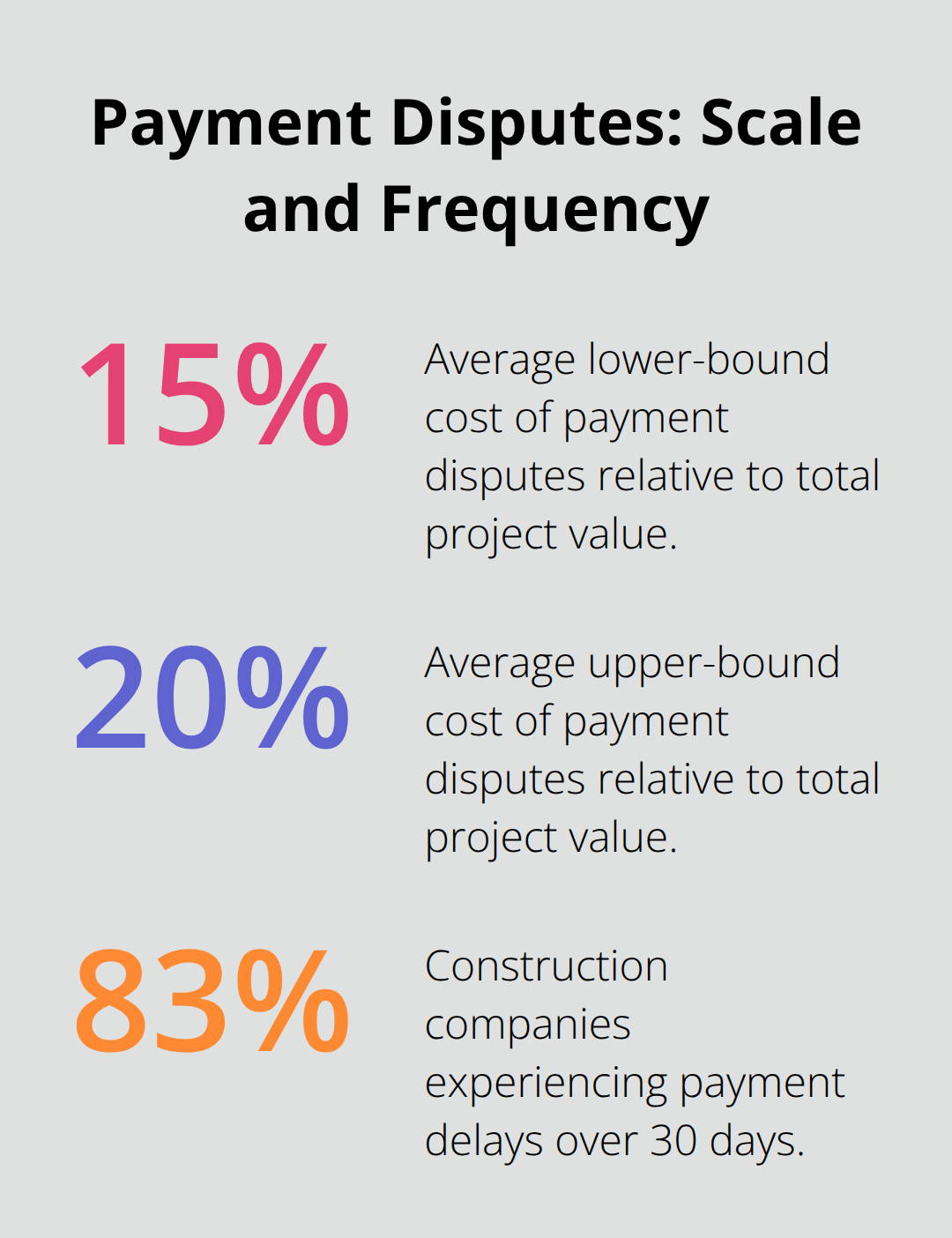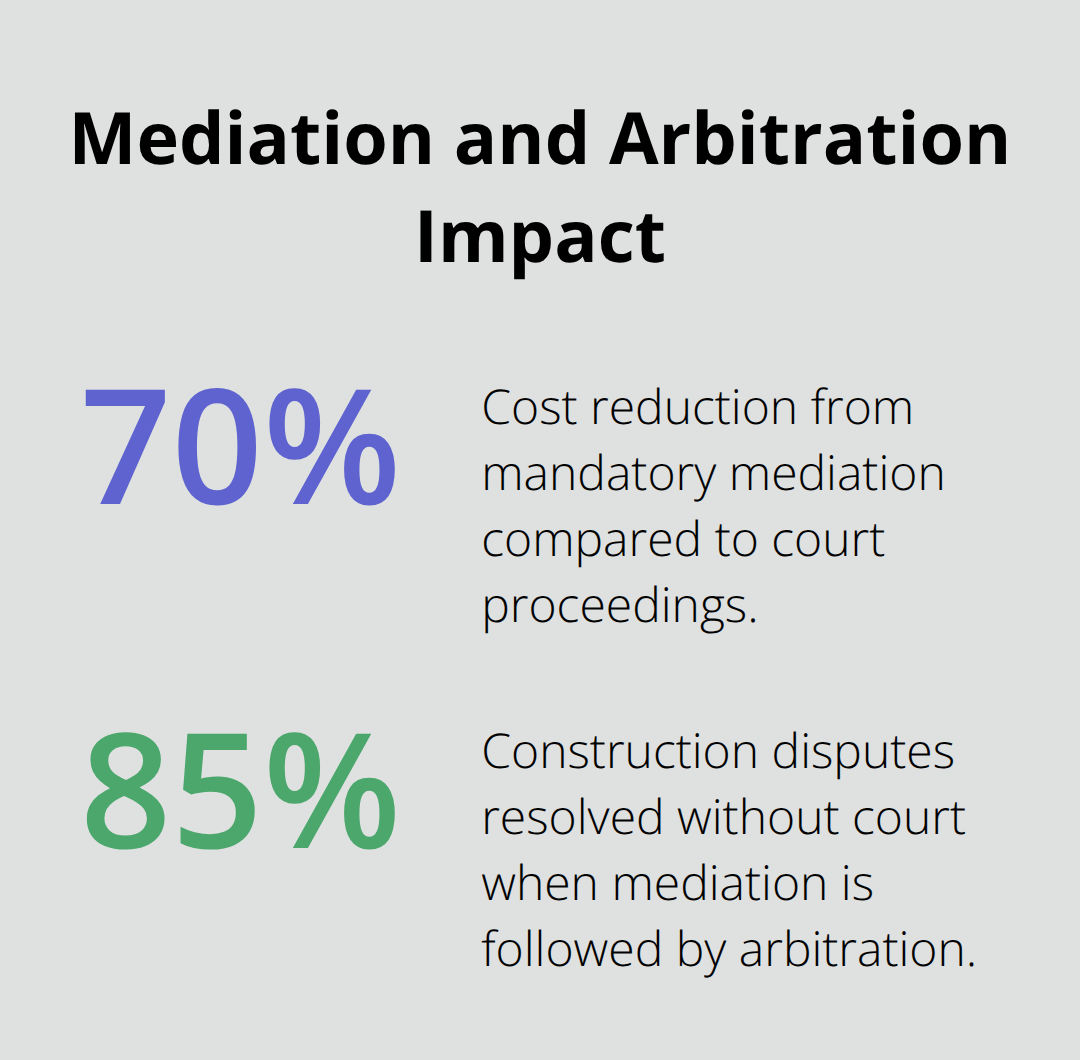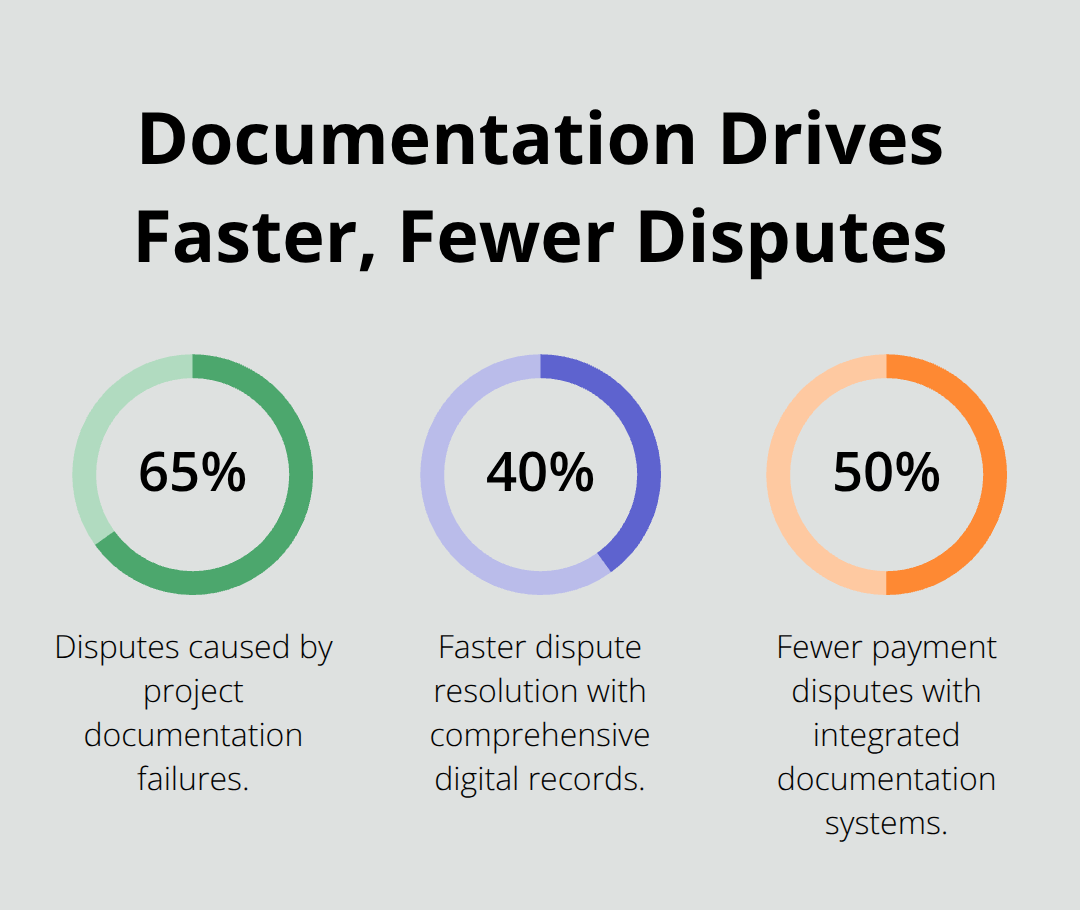Construction Legal Issues: How to Protect Your Project
Our Blog
Construction Legal Issues: How to Protect Your Project

Construction projects face legal challenges that can derail timelines and budgets. Payment disputes, safety violations, and contract breaches cost the industry billions annually.
We at Harnage Law PLLC see these issues impact projects of all sizes. Smart legal planning prevents most construction disputes before they start.
The right construction legal advice protects your investment and keeps your project moving forward.
What Construction Disputes Cost Your Project
Payment Disputes Create Financial Cascades
Contract breaches and payment delays dominate construction litigation, with the average payment dispute costing projects 15-20% of their total value according to recent industry data. Payment delays cascade through every level of a project when general contractors withhold payments from subcontractors who then cannot pay suppliers. This chain reaction stops work and triggers legal action across multiple parties.
These disputes often stem from poorly defined payment schedules, vague milestone descriptions, or disagreements over completed work quality. The Construction Financial Management Association reports that 83% of construction companies experience payment delays that exceed 30 days, which forces them to choose between legal action or absorbing losses.

Design Defects Generate the Highest Legal Costs
Design defects and construction errors generate the most expensive legal battles in construction. When architectural plans contain errors or construction work fails to meet specifications, the resulting disputes can exceed project costs by 200-300%. These cases involve multiple parties (architects, engineers, contractors) and complex technical evidence that extends litigation timelines.
Construction defect claims typically require extensive investigation, testing, and reconstruction analysis. The complexity of proving fault among various parties drives up legal costs and creates uncertainty about final resolution amounts.
Safety Violations Create Immediate Legal Exposure
Worker safety violations create immediate legal exposure through OSHA fines and long-term liability through injury claims. Construction sites with inadequate safety programs face average OSHA penalties of $15,625 per violation, while serious safety incidents trigger lawsuits that can reach millions in damages.
The Bureau of Labor Statistics shows construction workers suffer fatal injuries at twice the rate of other industries, making safety compliance both a legal requirement and financial necessity. Projects that experience any of these disputes see completion delays that average 4-8 months beyond original schedules.
Smart contract planning addresses these common dispute triggers before they derail your project timeline and budget.
What Contract Terms Actually Prevent Legal Disasters
Construction contracts must contain specific legal protections that address the three primary dispute triggers: payment schedules, scope definitions, and liability allocation. Projects with contracts that lack these protections face 60% higher dispute rates according to the American Institute of Architects. The most effective contracts establish daily penalty rates for payment delays, typically from $500 to $2,000 per day (depending on project size). These penalties create immediate financial consequences that motivate timely payments and reduce the 83% payment delay rate the Construction Financial Management Association reports.
Payment Terms That Actually Work
Successful construction contracts specify payment within 15 days of invoice submission rather than the standard 30-day terms that create cash flow problems. Include automatic lien rights that activate after 20 days of non-payment, which gives contractors immediate legal recourse without additional paperwork. Smart contracts also require progress payments tied to specific milestones with photographic documentation, which eliminates disputes over completion percentages that cause 40% of payment disagreements.
Dispute Resolution Clauses That Save Money
Mandatory mediation before litigation reduces dispute resolution costs by 70% compared to court proceedings. Contracts should specify mediation within 60 days of dispute notice, followed by arbitration if mediation fails. This two-step process resolves 85% of construction disputes without court involvement.

Include provisions that require the party who loses to pay all mediation and arbitration costs, which discourages frivolous claims.
Insurance Requirements That Transfer Risk
General liability coverage must exceed $2 million per occurrence with additional insured endorsements that cover all project stakeholders. Workers compensation insurance should include waiver of subrogation clauses that prevent insurance companies from pursuit of claims against other project parties. Performance bonds equal to 100% of contract value protect against contractor default, while payment bonds guarantee subcontractor payments even if the general contractor fails financially.
These contract protections work only when you implement them correctly and monitor compliance throughout your project timeline.
How Do You Prevent Legal Disasters During Construction
Project documentation failures cause 65% of construction disputes according to the Construction Industry Institute. Real-time record maintenance serves as your strongest legal defense. Daily photo logs with timestamps prevent disputes over work quality and completion status.

Detailed change order documentation stops scope creep arguments that average $47,000 in legal costs per project. The National Institute of Standards and Technology found that projects with comprehensive digital records resolve disputes 40% faster than those that rely on paper trails or memory.
Document Everything That Affects Money or Timeline
Smart contractors photograph every work phase, weather condition, and site obstacle with GPS-enabled cameras that create legally admissible evidence. Email confirmations for all verbal agreements within 24 hours eliminate he-said-she-said disputes that destroy project relationships. Track material deliveries, worker attendance, and equipment downtime in cloud-based systems that multiple parties can access. This prevents information disputes that cause 30% of project delays. The Associated General Contractors reports that projects with integrated documentation systems experience 50% fewer payment disputes compared to traditional record maintenance methods.
Communication Protocols That Prevent Lawsuits
Weekly progress meetings with written minutes distributed within 48 hours keep all parties aligned on project status and prevent miscommunication disputes. Establish single points of contact for each trade to avoid conflicting instructions that create liability issues. Require written approval for any work deviation that exceeds $1,000 (which stops unauthorized work claims that average $23,000 in dispute costs). Projects that follow structured communication protocols complete 15% faster and face 60% fewer legal challenges according to the Project Management Institute.
Permit Compliance That Protects Your Investment
Obtain all required permits before work begins to avoid stop-work orders that cost projects an average of $3,500 per day in delays. Schedule inspections at proper intervals rather than waiting until completion, which prevents costly rework when inspectors find violations. Maintain current copies of all permits on-site and assign responsibility for permit compliance to specific team members. Projects that fail permit inspections face average penalties of $2,800 per violation plus mandatory work stoppages.
Final Thoughts
Construction legal risks destroy project budgets and timelines when you ignore early warning signs. The data shows clear patterns: projects with comprehensive contracts, daily documentation, and proactive communication face 60% fewer disputes and complete 15% faster than those that rely on reactive legal responses. Start legal protection during project planning, not after problems emerge.
Implement structured payment terms with automatic penalties, require mandatory mediation clauses, and maintain digital records of every decision that affects cost or schedule. These steps prevent the payment delays that affect 83% of construction companies and the scope disputes that average $47,000 in legal costs. Seek construction legal advice immediately when payment delays exceed 20 days, when safety violations occur, or when any party disputes work quality or completion status.
Early legal intervention costs significantly less than litigation that can exceed project values by 200-300%. We at Harnage Law PLLC handle complex civil litigation and provide strategic counsel for construction disputes across Florida. Our attorneys fight aggressively to protect your project investment and achieve favorable outcomes through personalized legal representation.
